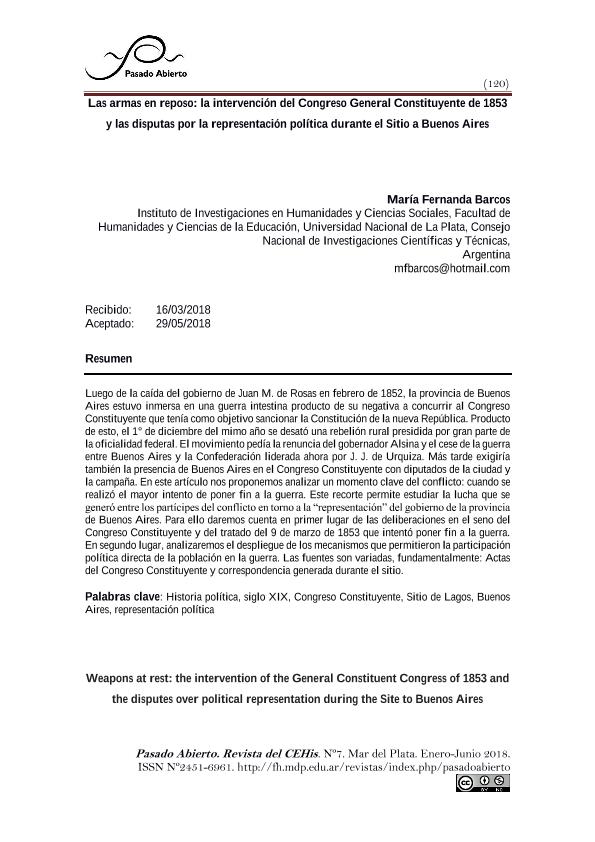Mostrar el registro sencillo del ítem
dc.contributor.author
Barcos, Maria Fernanda

dc.date.available
2019-10-24T15:54:05Z
dc.date.issued
2018-06
dc.identifier.citation
Barcos, Maria Fernanda; Las armas en reposo: la intervención del Congreso General Constituyente de 1853 y las disputas por la representación política durante el Sitio a Buenos Aires; Universidad Nacional de Mar del Plata. Facultad de Humanidades. Centro de Estudios Históricos; Pasado Abierto; 4; 7; 6-2018; 120-147
dc.identifier.uri
http://hdl.handle.net/11336/87204
dc.description.abstract
Luego de la caída del gobierno de Juan M. de Rosas en febrero de 1852, la provincia de Buenos Aires estuvo inmersa en una guerra intestina producto de su negativa a concurrir al Congreso Constituyente que tenía como objetivo sancionar la Constitución de la nueva República. Producto de esto, el 1° de diciembre del mimo año se desató una rebelión rural presidida por gran parte de la oficialidad federal. El movimiento pedía la renuncia del gobernador Alsina y el cese de la guerra entre Buenos Aires y la Confederación liderada ahora por J. J. de Urquiza. Más tarde exigiría también la presencia de Buenos Aires en el Congreso Constituyente con diputados de la ciudad y la campaña. En este artículo nos proponemos analizar un momento clave del conflicto: cuando se realizó el mayor intento de poner fin a la guerra. Este recorte permite estudiar la lucha que se generó entre los partícipes del conflicto en torno a la ?representación? del gobierno de la provincia de Buenos Aires. Para ello daremos cuenta en primer lugar de las deliberaciones en el seno del Congreso Constituyente y del tratado del 9 de marzo de 1853 que intentó poner fin a la guerra. En segundo lugar, analizaremos el despliegue de los mecanismos que permitieron la participación política directa de la población en la guerra. Las fuentes son variadas, fundamentalmente: Actas del Congreso Constituyente y correspondencia generada durante el sitio.
dc.description.abstract
After the fall of the government of Juan M. de Rosas in February 1852, the province of Buenos Aires was immersed in an internal war as a result of its refusal to attend the Constituent Congress, which aimed to sanction the Constitution of the new Republic. As a result of this, on December 1 of the same year a rural rebellion broke out, presided over by a large part of the federal officials. The movement called for the resignation of Governor Alsina and the cessation of the war between Buenos Aires and the Confederation now led by J. J. de Urquiza. Later he would also demand the presence of Buenos Aires in the Constituent Congress with deputies from the city and the campaign. In this article we propose to analyze a key moment of the conflict: when the greatest attempt was made to end the war. This cut allows us to study the struggle that was generated among the participants in the conflict over the "representation" of the government of the province of Buenos Aires. To do this, we will first give an account of the deliberations within the Constituent Congress and the treaty of March 9, 1853, which attempted to end the war. Secondly, we will analyze the deployment of the mechanisms that allowed the direct political participation of the population in the war. The sources are varied, basically: Constituent Assembly minutes and correspondence generated during the site.
dc.format
application/pdf
dc.language.iso
spa
dc.publisher
Universidad Nacional de Mar del Plata. Facultad de Humanidades. Centro de Estudios Históricos
dc.rights
info:eu-repo/semantics/openAccess
dc.rights.uri
https://creativecommons.org/licenses/by-nc/2.5/ar/
dc.subject
HISTORIA POLÍTICA
dc.subject
SIGLO XIX
dc.subject
CONGRESO CONSTITUYENTE
dc.subject
SITIO DE LAGOS
dc.subject
BUENOS AIRES
dc.subject
REPRESENTACIÓN POLÍTICA
dc.subject.classification
Otras Historia y Arqueología

dc.subject.classification
Historia y Arqueología

dc.subject.classification
HUMANIDADES

dc.title
Las armas en reposo: la intervención del Congreso General Constituyente de 1853 y las disputas por la representación política durante el Sitio a Buenos Aires
dc.title
Weapons at rest: the intervention of the General Constituent Congress of 1853 and the disputes over political representation during the Site to Buenos Aires
dc.type
info:eu-repo/semantics/article
dc.type
info:ar-repo/semantics/artículo
dc.type
info:eu-repo/semantics/publishedVersion
dc.date.updated
2019-10-16T14:29:59Z
dc.identifier.eissn
2451-6961
dc.journal.volume
4
dc.journal.number
7
dc.journal.pagination
120-147
dc.journal.pais
Argentina

dc.journal.ciudad
Mar del Plata
dc.description.fil
Fil: Barcos, Maria Fernanda. Universidad Nacional de La Plata. Facultad de Humanidades y Ciencias de la Educación. Instituto de Investigaciones en Humanidades y Ciencias Sociales; Argentina
dc.journal.title
Pasado Abierto
dc.relation.alternativeid
info:eu-repo/semantics/altIdentifier/url/http://fh.mdp.edu.ar/revistas/index.php/pasadoabierto/article/view/2626
Archivos asociados
